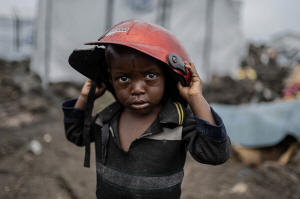110,000 people are stranded in eastern Congo as rebels are accused of
forced return
 Send a link to a friend
Send a link to a friend
 [February 12, 2025]
By CHINEDU ASADU and JUSTIN KABUMBA [February 12, 2025]
By CHINEDU ASADU and JUSTIN KABUMBA
GOMA, Congo (AP) — Rwanda-backed rebels controlling cities in eastern
Congo have forcibly closed settlement camps, leading to the displacement
of more than 110,000 people in recent days, the U.N. and locals said
Tuesday.
The M23 rebels — the most prominent of more than 100 armed groups vying
for control of Congo's mineral-rich east — captured Goma, the region's
largest city in late January in a major escalation of the yearslong
fighting with government forces. The rebels' advance into Goma has
killed at least 2,000 people in and around the city, Congolese
authorities have said.
M23 issued a 72-hour ultimatum to displaced people to leave settlement
camps and return to their villages, the U.N.’s humanitarian aid
coordination agency, OCHA, said in its briefing on Tuesday. It was the
latest action taken by the rebels after they said their priority was to
restart normal activities in the city.
Though the rebels later clarified that returns should be voluntary, OCHA
said more than 110,000 displaced people have left such camps for distant
villages that aid groups have warned are further afar from the reach of
aid.

Associated Press journalists witnessed many displaced families in
settlement camps in Goma dismantling makeshift shelters and packing up
what was left of their belongings.
“I am surprised because we are asked to leave, yet I have nothing to
give to the children,” said Sibomana Safari, who was leaving Bulengo
displacement camp in the city. “We all (are) leaving without any help
(and) I don’t know if we’re going to make it,” said Safari.
At least 500,000 people have been displaced in the region following the
M23's advance, according to the Forum of International Non-Governmental
Organisations. Goma was hosting close to a million displaced people
before the escalation of fighting on Feb. 26.
[to top of second column]
|

A child displaced by the fighting between M23 rebels and government
soldiers holds a damaged helmet at the camp in Goma, Democratic
Republic of the Congo, Tuesday, Feb. 11, 2025. (AP Photo/Moses
Sawasawa)

“The situation is extremely worrying,” said Oonagh Curry, an
emergency coordinator for French medical charity Doctors Without
Borders, or MSF. “The current situation is very fluid. It is
extremely important to keep in mind that a sudden movement of a
population can worsen the humanitarian crisis that was already
underway,” Curry added.
Kwimana Sifa, among those leaving the Bulengo displacement camp,
said he had no place to go after his house was destroyed by a bomb.
“It is better to leave us here. Although we lack food, we have
shelter here,” a distraught Sifa said. “What we want is just peace
and nothing else."
Although the rebels declared a unilateral ceasefire last week,
locals continue to report pockets of fighting between M23 and
government forces as the rebels move towards South Kivu’s provincial
capital of Bukavu.
The rebels on Tuesday threatened to act over killings it said were
happening in Bukavu which is about 50 kilometers (31 miles) away
from their reach.
“The situation in Bukavu is deteriorating dangerously. Our
compatriots are continually being killed,” M23 spokesperson Lawrence
Kanyuka said on X. “If these crimes persist, we will take our
responsibilities to eradicate the threat at its source and protect
our people,” he added.
____
Asadu reported from Abuja, Nigeria
All contents © copyright 2025 Associated Press. All rights reserved |